| CULTURE
Knowledge and skill reside in a restricted
community of practice, institutionalized in caste, organized within
a family/neighborhood. All members participate according to age
and ability. The weavers of Puttapaka, Nalgonda District belong
to the padmasali sub-caste, claiming to be the descendants of
the god Markandeya, who's son Bhavana Rishi bore 101 sons who
became weavers. The first cloth they wove was from the fibres
of the lotus stem and so they came to be known as padmasali or
lotus weavers.
Life and activities revolve around the
family and religion. Celebrations of weddings, births, festivals
and pujas (worship) make a rich social life bringing play into
a life disciplined by rigorous work schedules.
Woman's work begins at daybreak, with thorough
sweeping of the home, entrance, and street outside. This is followed
by application of a thin slurry of cattle dung and water which
gives a fine coat to the earthen road, controlling dust and inhibiting
insect pests. Upon drying, the roadside entrance is finely decorated
with lines of powdered lime drawn by skilled fingers creating
symbols of beauty as well as good fortune.
Women then help in the weaving practice
by winding bobbins, making warps, tying resist areas, or any of
the many tasks involved in lengthy procedure.
Children have long days at school attending
until Saturday lunchtime. They still have time to help with weaving
processes as needed, occasionally during their lunch break. Gradually
their skill develops learned from practical experience. However
today parents are encouraging their children to gain skills outside
the weaving village, many opting for computer training.
Village men are the weavers, putting in
long hours to produce their textiles. However relaxing on a holiday
can mean having a 'toddy' party. Toddy, also known as 'White
Water' locally, is a mildly alcoholic drink taken from the
liquid of a palm tree. Toddy 'tappers' climb the palms, hanging
terracotta pots in the trees to collect the liquid which drips
from cuts made at the base of leaves. These men are drinking
from disposable cups crafted from the palm leaf.
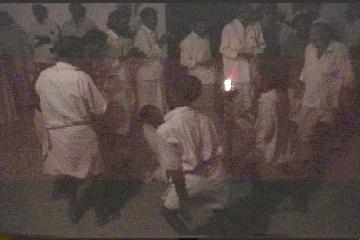
Hear singer - click at left
family puja (worship) procession headed for
the weavers temple dancing and singing along the way.
|
Markandeya, the Weavers' god

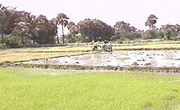
rice field preparation
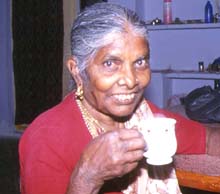 Family
Matriarch, Narasamma enjoys a cup of tea, an important social
activity Family
Matriarch, Narasamma enjoys a cup of tea, an important social
activity
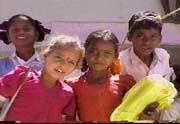
inquisitive school children
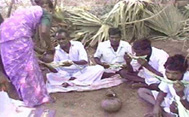
toddy party
|